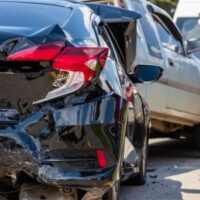Understanding Florida’s Rear End Accident Liability Presumption

Rear end accidents in Florida are quite common. When they do happen, accident victims have one thing that can help them in their case: The presumption of liability in rear end accident cases.
Proof in Car Accident Cases
Normally, when there is a car accident case, the victim needs to prove two things. The first thing is to prove that the Defendant actually did something wrong, and what they did wrong. The second thing the victim has to prove is that he or she was injured, and the extent of the injuries.
Presumption of Liability
That first part is made a bit easier, in rear end accident cases. That’s because in rear end accident cases, there is a presumption of liability against the car that hits the car in front.
That means that the victim doesn’t have to prove that the car behind (the one that did the rear-ending), did anything wrong. The victim doesn’t have to prove what, precisely, the car behind the victim did wrong.
The mere fact that the car behind hit the car in front, is an automatic assumption of liability. This means one less thing-and a major thing-that a victim has to prove in a rear end accident case.
Presumption Can be Overcome
This is, however, just a presumption. The Defendant can overcome the presumption by putting on evidence overcoming or rebutting the presumption, although that isn’t easy to do, and the circumstances where it can be done are limited.
For example, the car behind can show the car in front suddenly and unexpectedly made a stop, in a way or location that a stop wouldn’t be expected. If a driver suddenly put on his or her breaks in the middle of a roadway, that would be an example.
If a car were to suddenly change lanes, and be too close to the car behind him, causing a rear end accident, that may overcome the presumption as well.
The Defendant can also show some mechanical failure caused the accident, in order to overcome the presumption.
Loss of consciousness could also overcome the presumption-but only where the loss of consciousness was unforeseeable. Someone who knew he or she was prone to passing out, or who may have hit their head, or who may be on medication that has side effects, could not argue a sudden and unexpected loss of consciousness caused a rear end accident.
Admitting Liability
Although there are some exceptions, because of the presumption, most Defendants in rear end cases, will simply admit liability. But that doesn’t mean your case is over and won. The victim still needs to prove damages, and that he or she has sustained a serious, permanent injury in order to recover anything in a rear end car accident case.
Contact the Tampa personal injury lawyers at Barbas, Nunez, Sanders, Butler & Hovsepian and schedule a consultation today for help in your rear end accident case.
Sources:
nhtsa.gov/document/analyses-rear-end-crashes-and-near-crashes-100-car-naturalistic-driving-study-support-rear
law.cornell.edu/wex/presumption




